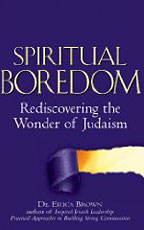Erica Brown is director of adult education for the Partnership for Jewish Life and Learning and scholar-in-residence at the Jewish Federation of Greater Washington. We live in a fast-paced society where many people need to be stimulated all the time. We spend our lives whirling around and around in constant motion. There is little time to count our blessings or to pause for moments of wonder and awe. Tapping into psychology, philosophy, and theology, along with Jewish texts, Brown looks at the toll this lifestyle is taking on Judaism in synagogues, schools, and community life.
The author quotes psychologist Dr. Bruce Leckart who observes: "The principal emotional component of boredom is a feeling of uninvolvement, a lack of concentration, absence of motivation, a feeling of emptiness and, above all, no excitement or enthusiasm for what is happening." Brown refers to the wisdom of Solomon and observes that although boredom is a pesky problem, it should be viewed not as a permanent condition but as a temporary crisis. Hence, we can do an end run around this malady by constantly seeking meaning. And that's where Judaism offers help. Study, for example, is one of the cornerstones of faith. By studying the universe and engaging it with our minds, we don't give boredom any room to grow.
Still, this toxic feeling finds many avenues into our consciousness. It can take the vitality out of community, sap our energies and attention in meditation and prayer, and erode the disciplines of our spiritual life. The antidote is wonder which is juicy, vibrant, open, and always on the lookout for something fresh. It is a catalyst to other emotions such as joy, happiness, delight, and contentment. As Robert C. Fuller puts it, "Wonder, like heightened interest, momentarily, suspends habitual ways of looking at the world and instead lures people into new and creative engagement with their surroundings." This spiritual quality leads Jews to a deep appreciation for blessings and the Talmud's recommendation that we find 100 every day.
Brown also discusses being authentic, the art of seeing, and a culture of anomie. She concludes with an outstanding chapter on 10 ways to deal with boredom and three frameworks for changing our attitude toward it.
